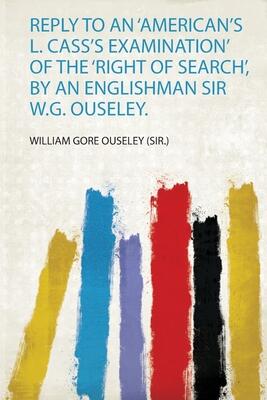
Reply to an 'American's L. Cass's Examination' of the 'Right of Search', by an Englishman Sir W.G. Ouseley.
by
William Gore Ouseley (sir )
No ratings yet
Romance
Mystery
Business & Economics
Format
Paperback
Pages
192
Language
English
Published
Aug 2, 2019
Publisher
Hardpress Publishing
ISBN-10
1406911348
ISBN-13
9781406911343
Description
In the discourse surrounding maritime law and international relations, an English voice emerges, representing a perspective shaped by the historical context of British-American tensions. Engaging with the critique provided by an American counterpart, Sir William Gore Ouseley articulates a response that navigates the complexities of the 'Right of Search.' His examination delves into legal justifications, sovereignty, and the intricate balance of power on the seas.
With a scholarly tone, Ouseley presents arguments grounded in the legal principles of his time, while also addressing the implications these laws have on diplomatic relations. His insights illuminate the nuances of the 'Right of Search,' reflecting a deep understanding of the geopolitical climate and the moral underpinnings of maritime law. The work unfolds like a dialogue, merging legal discourse with the emotional weight of national pride and global responsibility.
As a reproduction of the original artefact, this piece provides a window into the historical debates that shaped international maritime norms. Readers are invited to explore not only the legal arguments but also the broader implications of these discussions on modern international relations, making Ouseley’s examination a significant read for those interested in the evolution of maritime law and British-American interactions.
With a scholarly tone, Ouseley presents arguments grounded in the legal principles of his time, while also addressing the implications these laws have on diplomatic relations. His insights illuminate the nuances of the 'Right of Search,' reflecting a deep understanding of the geopolitical climate and the moral underpinnings of maritime law. The work unfolds like a dialogue, merging legal discourse with the emotional weight of national pride and global responsibility.
As a reproduction of the original artefact, this piece provides a window into the historical debates that shaped international maritime norms. Readers are invited to explore not only the legal arguments but also the broader implications of these discussions on modern international relations, making Ouseley’s examination a significant read for those interested in the evolution of maritime law and British-American interactions.
Reviews
Reading Log
No reading logs found
Start tracking your reading progress to see logs here
Add Your First Reading LogNotes
Transaction Log
No transaction logs found
Start tracking your book transactions to see logs here
Add Your First Transaction Log